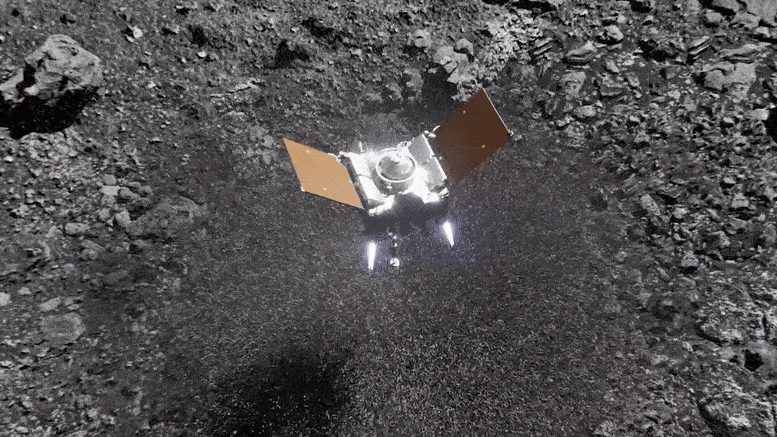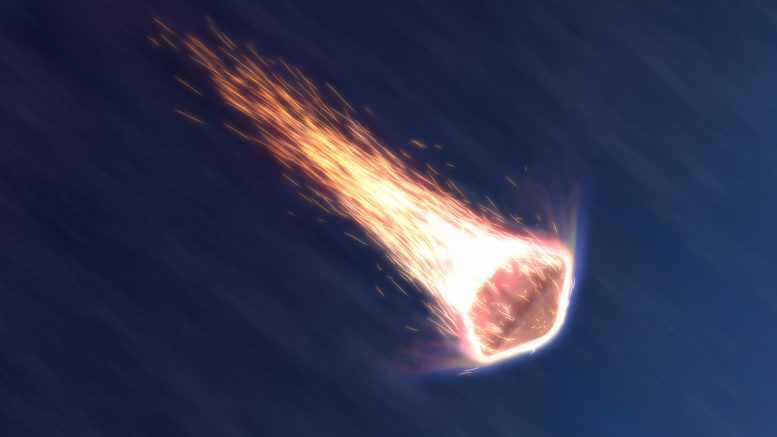A top-down view of the OSIRIS-REx Touch-and-Go-Sample-Acquisition-Mechanism (TAGSAM) head with the lid removed, revealing the remainder of the asteroid sample inside. Erika Blumenfeld, creative lead for the Advanced Imaging and Visualization of Astromaterials (AIVA) and Joe Aebersold, project management lead, captured this picture using manual high-resolution precision photography and a semi-automated focus stacking procedure. The result is an image that can be zoomed in on to show extreme detail of the sample. The remaining sample material includes dust and rocks up to about .4 in (one cm) in size. Credit: NASA/Erika Blumenfeld & Joseph Aebersold
The NASA OSIRIS-REx team received the prestigious Robert J. Collier Trophy for their historic mission of returning a sample from the asteroid Bennu. This achievement marks a significant milestone in space exploration, offering insights into the early solar system and aiding in the understanding of potentially hazardous asteroids.
NASA and the OSIRIS-REx (Origins, Spectral Interpretation, Resource Identification, and Security – Regolith Explorer) mission team have won the National Aeronautic Association’s (NAA) Robert J. Collier Trophy. NAA awards the trophy annually for what it determines is “the greatest achievement in aerospace and astronautics in America.” The OSIRIS-REx team will be celebrated at an award dinner on June 13, 2024, in Washington, D.C.
The NAA bestowed the Robert J. Collier Trophy on the team behind NASA’s OSIRIS-REx, acknowledging the mission’s place in aerospace history by being the first U.S. mission to collect a sample from an asteroid and deliver it to Earth for study.

NASA’s OSIRIS-REx spacecraft leaving the surface of asteroid Bennu after collecting a sample. Credit: NASA’s Goddard Space Flight Center/CI Lab/SVS
Groundbreaking Achievement in Space Exploration
“Congratulations to the OSIRIS-REx team on this well-deserved honor,” said NASA Administrator Bill Nelson. “By successfully designing, building, and carrying out the first U.S. mission to collect an asteroid sample, NASA proved once again that we do big things. Things that inspire the world. We look forward to the incredible science to come that will tell us more about our solar system and help protect humanity here on Earth.”
Established more than a century ago, the award has marked major achievements in the timeline of flight, including Orville Wright in 1913 for developing the automatic stabilizer; Air Force test pilot Chuck Yeager for his sound-barrier-breaking 1947 flight of the X-1 rocket plane; the crews of NASA’s Apollo 8, 11, and 15 for their missions to the Moon in the late 1960s and early ’70s; and NASA’s Ingenuity Mars Helicopter.

OSIRIS-REx’s sample return capsule experiences maximum heating in Earth’s atmosphere. Credit: NASA’s Goddard Space Flight Center/CI Lab
International Collaboration and Scientific Endeavors
The OSIRIS-REx team includes NASA’s Goddard Space Flight Center in Greenbelt, Maryland; Lockheed Martin in Littleton, Colorado; University of Arizona, Tucson; and KinetX in Tempe, Arizona.
The sample from the ancient asteroid Bennu that OSIRIS-REx delivered to Earth in September 2023 will give researchers worldwide a glimpse into the earliest days of our solar system, offering insights into planet formation and the origin of organics essential for life on Earth. Data collected by the spacecraft combined with future analysis of the Bennu sample will also aid our understanding of asteroids that could impact Earth.
The Collier Trophy adds to the recent Robert H. Goddard Memorial Trophy received by NASA’s OSIRIS-REx team in March 2024.
Following its successful sample return, the OSIRIS-REx spacecraft was renamed OSIRIS-APEX and will now enter an extended mission to visit and study near-Earth asteroid Apophis in 2029.
NASA Goddard provides overall mission management, systems engineering, and the safety and mission assurance for OSIRIS-REx. Dante Lauretta of the University of Arizona, Tucson, is the principal investigator. The university leads the science team and the mission’s science observation planning and data processing. Lockheed Martin Space in Littleton, Colorado, built the spacecraft and provides flight operations. Goddard and KinetX Aerospace are responsible for navigating the OSIRIS-REx spacecraft. Processing and curation for OSIRIS-REx’s Bennu sample takes place at NASA’s Johnson Space Center in Houston. International partnerships on this mission include the OSIRIS-REx Laser Altimeter instrument from CSA (the Canadian Space Agency) and asteroid sample science collaboration with JAXA’s (the Japan Aerospace Exploration Agency) Hayabusa2 mission. OSIRIS-REx is the third mission in NASA’s New Frontiers Program, managed by the agency’s Marshall Space Flight Center in Huntsville, Alabama, for the agency’s Science Mission Directorate at NASA Headquarters in Washington.





